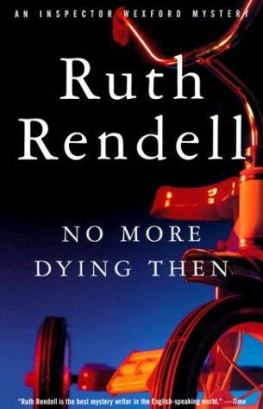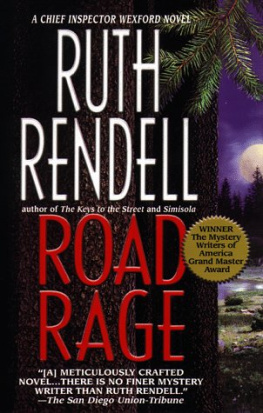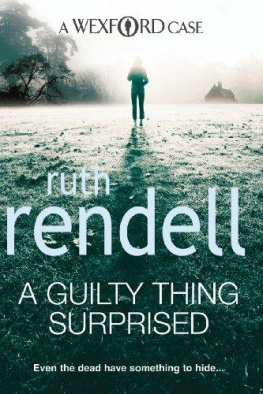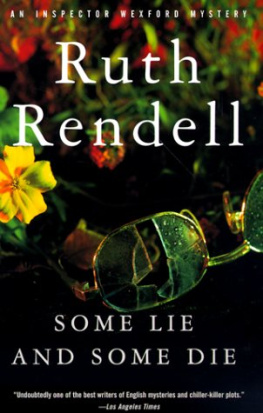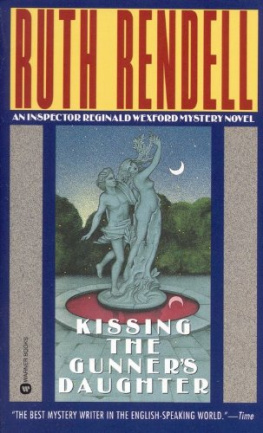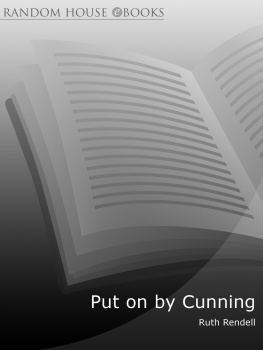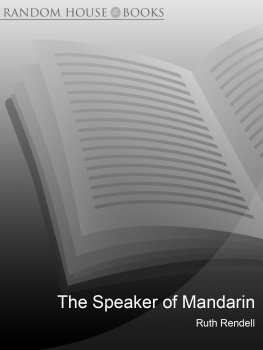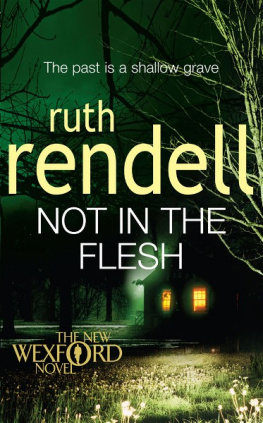The laws of the Realm may punish Christian men with death for heinous and grievous offences.
The Thirty-nine Articles.
It was five in the morning. Inspector Burden had seen more dawns than most men, but he had never quite become jaundiced by them, especially summer dawns. He liked the stillness, the sight of the little country town in a depopulated state, the hard blue light that was of the same shade and intensity as the light at dusk but without dusk's melancholy.
The two men they had been questioning about last night's fight in one of Kingsmarkham's cafes had confessed separately and almost simultaneously just a quarter of an hour before. Now they were locked into two stark white cells on the ground floor of this incongruously modern police station. Burden stood by the window in Wexford's office, looking at the sky which had the peculiar greenish tint of aquamarine. A flock of birds flying in dense formation crossed it. They reminded Burden of his childhood when, as at dawn, everything had seemed bigger, clearer and of more significance than it did today. Tired and a little sickened, he opened the window to get rid of cigarette smoke and the sweaty smell of youths who wore leather jackets in the height of summer.
Outside in the corridor he could hear Wexford saying good nightor good morningto Colonel Griswold, the Chief Constable. Burden wondered if Griswold had guessed when he arrived just before ten with a long spiel about stamping out hooliganism that he was in for an all-night session. That, he thought unfairly, was where meddling got you.
The heavy front door clanged and Griswold's car started. Burden watched it move off the forecourt, past the great stone urns filled with pink geraniums and into Kingsmarkham High Street. The Chief Constable was driving himself. Burden saw with approval and grudging amusement that Griswold drove at just about twenty-eight miles per hour until he reached the black and white derestriction sign. Then the car gathered speed and flashed away out of sight along the empty country road that led to Pomfret.
He turned round when he heard Wexford come in. The Chief Inspector's heavy grey face was a little greyer than usual, but he showed no other sign of tiredness and his eyes, dark and hard as basalt, showed a gleam of triumph. He was a big man with big features and a big intimidating voice. His grey suitone of a series of low fastening, double-breasted affairsappeared more shabby and wrinkled than ever today. But it suited Wexford, being not unlike an extension of his furrowed pachydermatous skin.
"Another job jobbed," he said, "as the old woman said when she jobbed the old man's eye out."
Burden bore with such vulgarisms stoically. He knew that they were meant to horrify him; they always succeeded. He made his thin lips crease into a tight smile. Wexford handed him a blue envelope and he was glad of the diversion to hide his slight embarrassment.
"Griswold's just given me this," Wexford said. "At five in this morning. No sense of timing."
Burden glanced at the Essex postmark. "Is that the man he was on about earlier, sir?"
"Well, I don't have fanmail from beautiful olde worlde Thringford as a general rule, do I, Mike? This is the Rev. Mr. Archer all right, taking advantage of the Old Pals' Act." He lowered himself into one of the rather flimsy chairs and it gave the usual protesting creak. Wexford had what his junior called a love-hate relationship with those chairs and indeed with all the aggressively modern furnishings of his office. The glossy block floor, the square of nylon carpet, the chairs with their sleek chrome legs, the primrose Venetian blindsall these in Wexford's estimation were not "serviceable", they were dust-traps and they were "chichi". At the same time he took in them an enormous half-secret pride. They had their effect. They served to impress visiting a strangers such as the writer of this letter Wexford was now taking from its envelope.
It too was written on rather thick blue paper. In a painfully authentic upper-class accent, the Chief Inspector said affectedly, "May as well get on to the Chief Constable of Mid-Sussex, my dear. We were up at Oxford together, don't you know?" He squeezed his face into a kind of snarling grin. "All among the bloody dreaming spires," he said. "I hate that sort of thing."
"Were they?"
"Were they what?"
"At Oxford together?"
"I don't know. Something like that. It may have been the playing fields of Eton. All Griswold said was, 'Now we've got those villains wrapped up, I'd like you to have a look at a letter from a very good friend of mine called Archery. Excellent fellow, one of the best. This enclosure's for you. I'd like you to give him all the help you can. I've a notion it's got something to do with that scoundrel Painter.' "
"Who's Painter?"
"Villain who got the chop about fifteen or sixteen years ago," said Wexford laconically. "Let's see what the parson has to say, shall we?"
Burden looked over his shoulder. The letter was headed St. Columba's Vicarage, Thringford, Essex. The greek e's awakened in him a small hostility. Wexford read it aloud.
" 'Dear sir, I hope you will forgive me for taking up your valuable time...' Don't have much choice, do I? '...but I regard this matter as being of some urgency. Col. Griswold, the Chief Constable of blah blah blah and so on, has very kindly told me you are the gentleman who may be able to assist me in this problem so I am taking the liberty, having first consulted him, of writing to you.' " He cleared his throat and loosened his crumpled grey tie. "Takes a hell of a time coming to the point, I must say. Ah, here we go. 'You will remember the case of Herbert Arthur Painter...' I will. 'I understand you were in charge of it. I therefore supposed I should come to you before pursuing certain enquiries which, much against my will, I am compelled to make.' "
"Compelled?"
"That's what the man says. Doesn't say why. The rest's a load of compliments and can he come and see me tomorrowno, today. He's going to phone this morning, but he 'anticipates my willingness to meet him.' " He glanced at the window to where the sun was coming up over York Street and with one of his distorted quotations, said, "I suppose he's sleeping in Elysium at this moment, crammed with distressful cold mutton or whatever parsons go to bed on."
"What's it all about?"
"Oh God, Mike, it's obvious, isn't it? You don't want to take any notice of this 'being compelled' and 'against his will' stuff. I don't suppose his stipend amounts to much. He probably writes true crime stories in between early Communion and the Mothers' Meeting. He must be getting desperate if he reckons on titillating the mass appetite by resurrecting Painter."
Burden said thoughtfully, "I seem to remember the case. I'd just left school..."
"And it inspired your choice of a career, did it?" Wexford mocked. " 'What are you going to be, son?' 'I'm going to be I detective, Dad.' "
In his five years as Wexford's right hand man, Burden had grown immune to his teasing. He knew he was a kind of safety valve, the stooge perhaps on whom Wexford could vent his violent and sometimes shocking sense of humour. The people of this little town, indiscriminately referred to by Wexford as "our customers" had, unless suspected of felony, to be spared. Burder was there to take the overflow of his chief's rage, ridicule and satire. Now he was cast as the sponge to soak up the scorn that was rightly the due of Griswold and Griswold's friend.
He looked shrewdly at Wexford. After a trying, frustrating day and night, this letter was the last straw. Wexford was suddenly tense with irritation, his skin more deeply wrinkled than usual, his whole body flexed with the anger that would not suffer fools gladly. That tension must find release.
Next page

